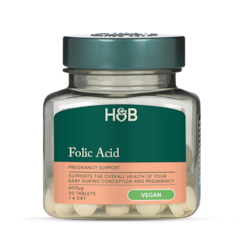20% off £30
Code:QUICK
A round-up of our top vitamin B supplements

Before we start, it’s probably best we explain one thing – vitamin B isn’t just one vitamin
Summary
A good all-rounder

Holland & Barrett
Holland & Barrett High Strength Complete Vit B Complex 120 Tablets
3 for 2 Mix & Match
£10.49
For hair, skin & nails

Holland & Barrett
Holland & Barrett Biotin 1000ug 30 Tablets
3 for 2 Mix & Match
£6.75
If you don’t like tablets

Floradix
Floradix Vitamin-B Complex Liquid Vitamin Formula 250ml
3 for 2 Mix & Match
£17.49
Thinking about taking a vitamin B supplement, but not too sure what the options are and which one’s best for you?
Well, vitamin B actually refers to the vitamin B complex, which is made up of eight B vitamins. The entire vitamin B family is made up of vitamin B1 (thiamine), B2 (riboflavin), B3 (niacin), B5 (pantothenic acid), B6 (pyridoxine), B7 (biotin), B9 (folate) and B12 (cobalamin).1,2
Naturally then, trying to work out which ones to take for your specific health needs is going to be confusing - but it’s not that complex. Here’s what each one does…
Why is vitamin B important?
Each B vitamin is an essential micronutrient.2 This means that B vitamins play key roles in enabling specific pathways in your body and generating other important substances the body needs.2 These are essential for keeping your cells working properly and maintaining homeostasis (your body’s ability to keep you alive in a range of conditions).2
So, in short, B vitamins are important for maintaining your body’s ability to keep you alive in a range of external conditions.2,3 Specifically:4
- thiamin (vitamin B1), riboflavin (vitamin B2), niacin (vitamin B3) and pantothenic acid (vitamin B5) – help your body to release energy from food and support the proper functioning of your nervous system
- pyridoxine (vitamin B6) – supports your body to store and use the energy from protein and carbohydrates and to create haemoglobin, which transports oxygen around the body
- biotin (vitamin B7) – helps to make fatty acids
- folate and folic acid (vitamin B9) – help your body to create healthy red blood cells and reduce the risk of birth defects in unborn babies
- cobalamin (vitamin B12) – helps your body to release the energy you get from food, use folate (vitamin B9), make red blood cells and maintain a healthy nervous system
Consequently, most of these ‘family members’ play a key role in helping your body metabolise food and manage its energy levels. Some studies even suggest that B vitamins are associated with slowed cognitive decline.4,5
However, the only B vitamin the body can produce itself is biotin (B7), in small amounts, which is why we need to make sure we’re taking B vitamins – either through our food or supplementation.1
Our top B vitamin supplements
Suitable for vegans, these vitamin B complex capsules from Solgar deliver an extra high potency 100mg formulation of key B vitamins. Containing all the B vitamins you need, they may contribute to the reduction of tiredness, support a healthy metabolism, and aid normal mental performance, among other benefits, for people with low B vitamin levels.6
Solgar's unique formula delivers thiamine (B1), riboflavin (B2), niacin (B3), pantothenic acid (B5) and vitamin B6, along with other B vitamins, such as folic acid, biotin (B7) and vitamin B12.
Although not dependent on dietary fat for absorption, it’s recommended to take the capsules with a meal.
These tablets are an excellent source of B vitamins, containing B1, B2, B3, B5, B6, B9 and B12.
They may support normal energy-yielding metabolism, red blood cell production and psychological function.7 Plus, they might help to keep your skin and hair looking healthy, as well as contribute to the reduction of tiredness and fatigue.4,7
These tablets are suitable for vegetarians and vegans. Just take two each day with meals.
As vitamin B12 is predominantly found in animal products, supplements are particularly recommended for those following plant-based or vegan diets. However, B12 deficiency is more common in those of advanced age or who have had certain types of gastrointestinal surgery, so it may also be useful for those people to take a B12 supplement.8
In quick and convenient, oral spray form, this vegan B12 supplement can help to ensure you’re getting the B12 you need for normal functioning.
Spray four under the tongue or inside the cheek for greater absorption.
Part of the B vitamin family, biotin is an essential vitamin.4 It can be found in a range of food sources, but not all of them are vegan.4 This is why our biotin tablets are suitable for vegans and vegetarians, so you can get the biotin you need without compromising your diet.
Take one or two tablets a day with meals.
If you’re trying to conceive or are currently pregnant, the NHS recommend taking folic acid while trying to get pregnant and during the first 12 weeks of pregnancy. This is because folate is used by the body to make new cells during the early development of tissues and organs in the first weeks of pregnancy.
As a result, taking folic acid may help prevent birth defects (particularly on the neural tube, which develops into the brain and spinal cord).10,11
One a day with a meal.
This handy and convenient liquid formula provides the body with sufficient amounts of B complex vitamins, including vitamins B1, B2, niacin, B6, biotin and B12.
Containing no alcohol, preservatives, colourings or artificial flavourings, this supplement is also free from lactose, yeast and gluten, which makes it suitable for vegetarians and vegans.
But just how can taking a B complex formula support your health? Let’s break it down:
- vitamins B1, B2, B6, B12 and niacin contribute to normal energy-yielding metabolism and healthy function of the nervous system4
- vitamins B2, B6, B12 and niacin contribute to the reduction of tiredness and fatigue6
- vitamins B6, B9 and B12 help normal red blood cell formation.6
Not bad for one supplement!
Adults should take 20ml once a day. Children aged 7-11 should take 10ml once a day and children aged 3-6 should take 5ml once a day.
Containing a blend of 26 fruits and vegetables, they deliver a delicious tropical flavour.
They’re suitable for vegetarians and contain vitamins B2, B3, B5, B6 and B12 to support normal energy production and the reduction of tiredness and fatigue.4,6
Chew two gummies once a day.
The final say
Depending on your specific health needs, you may want to take a supplement that targets certain B vitamins. Or you may want to choose one that covers the entire vitamin B complex.
You can find our full range of vitamin B supplements here. For personalised advice, you should always speak to a healthcare professional, such as a GP or registered dietician.
The advice in this article is for information only and should not replace medical care. Please check with your GP or healthcare professional before trying any supplements, treatments or remedies. Food supplements must not be used as a substitute for a varied and balanced diet and a healthy lifestyle.
- Ali MA, et al. Dietary vitamin B complex: Orchestration in human nutrition throughout life with sex differences. Nutrients. 2022;14(19):3940. https://doi.org/10.3390/nu14193940
- Peterson CT, et al. B vitamins and their role in immune regulation and cancer. Nutrients. 2020;12(11):3380. https://doi.org/10.3390/nu12113380
- Billman GE. Homeostasis: The underappreciated and far too often ignored central organizing principle of physiology. Front Physiol. 2020;11(200). https://doi.org/10.3389/fphys.2020.00200
- NHS. B vitamins and folic acid - Vitamins and minerals [Internet]. [cited 2024 May 17]. Available from: https://www.nhs.uk/conditions/vitamins-and-minerals/vitamin-b/
- Wang Z, et al. B vitamins and prevention of cognitive decline and incident dementia: A systematic review and meta-analysis. Nutr Rev. 2022;80(4):931–49. https://doi.org/10.1093/nutrit/nuab057
- Tardy A-L, et al. Vitamins and minerals for energy, fatigue and cognition: A narrative review of the biochemical and clinical evidence. Nutrients. 2020;12(1):228. https://doi.org/10.3390/nu12010228
- Dattola A, et al. Role of vitamins in skin health: A systematic review. Curr Nutr Rep. 2020;9(3):226–35. https://doi.org/10.1007/s13668-020-00322-4
- Ankar A, et al. Vitamin B12 deficiency. Treasure Island (FL): StatPearls Publishing; 2022. Available from: https://www.ncbi.nlm.nih.gov/books/NBK441923/
- Saleem F, et al. Biotin deficiency. Treasure Island (FL): StatPearls Publishing; 2023. Available from: https://europepmc.org/article/nbk/nbk547751#free-full-text
- Argyridis S. Folic acid in pregnancy. Obstet, Gynaecol Reprod Med. 2019;29(4):118–20. https://www.sciencedirect.com/science/article/abs/pii/S1751721419300260
- Sijilmassi O. Folic acid deficiency and vision: A review. Graefe’s Arch Clin Exp Ophthalmol. 2019;257(8):1573–80. https://doi.org/10.1007/s00417-019-04304-3











































